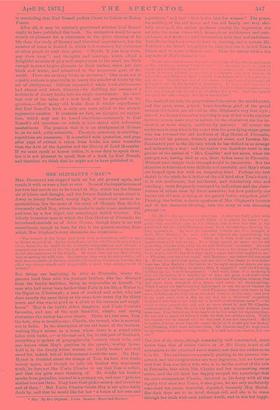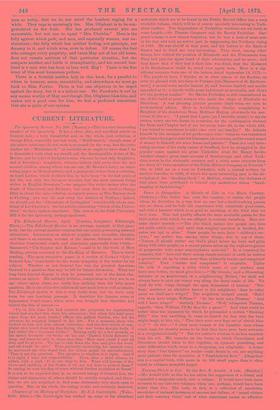MRS. OLIPHANT'S "MAY."
MRS. OLIPIIANT has stepped back on her old ground again, and treads it with as sure a foot as ever. None of the imperfections of her two last novels are to be traced in May, which has the former air of leisure and thought, and the former finished touch about it. Away in breezy Scotland, among high, if somewhat narrow re- spectabilities, lies the scene of the story of Marjory Ilay-II eriot, commonly called May, whom the reader is made to see, understand, and love, by a few slight, but exceedingly skilful touches. The soberly humorous tone in which the lay.Heriots of Pitcomlie are introduced reminds us of Adam Grxme, though there is no real resemblance, except in tone, for this is the general outline, from which Mrs. Oliphant's story chronicles the departures :—
" The history of the house had been very monotonous, without ups Or downs to speak of. In the vicissitudes of the rebellions they had kept clear, being too far south to be seriously compromised, and though a younger son was out in the '45, that did rot affect either the character or the circumstances of the family. In short, this was the Hay-Heriot way of sowing its wild oats. Its younger sons were its safety-valve, all that was eccentric in the race ran into those stray branches, leaving the -elder son always steady and respectable, a most wise arrangement of nature."
But things are beginning to alter at Pitcoinlie, where the present laird lives with his younger brother, who has diverged from the family tradition, being as respectable as himself, "a man who had never been farther than Paris in his life, a Writer to the Signet in Edinburgh ; a man of method and order, who had done exactly the same thing at the same hour every day for thirty years, and who was as good as a clock to his servants and neigh- bours)." May is the laird's eldest daughter, and Uncle Charles's favourite, and one of the most beautiful, simple, and strong characters the author has ever drawn. There are two sons, Tom, the heir, who is troublesome ; Charlie, the second, who is married,
out in India. In the description of the old house, of the brothers, waiting May's return in a room where there is a round table laden with books,—" at the east end, for, in this part of Scotland, everything is spoken of geographically,"—every touch tells, and one knows what May's position in the quaint, worthy house-
hold is, in the family whose women are kindly treated and well eared for, indeed, but of little account beside the men. Mr. Hay- Heriot is troubled about the doings of Tow, his heir, who wants money again, and though be tells his brother this unpleasant
truth, he does not like Uncle Charles to say that Tom is selfish, and that the girls want thinking of. Ile thinks his brother
speaks from prejudice, natural in a younger son, and that "girls are neither here nor there. They have their pickie- money, and there's an
end of them." But Uncle Charles thinks May is not quite fairly dealt by, and that he would like for her 'a house of her own and * May. By Mrs. Oliphant. 3 vols. Lonckn: Hurst and Blackett. goochnan," and that " that is the best for women." The peace, ! the stability of the old house mei the old family are very skil- fully conveyed, the author produces exactly the impression she intends, the storm conies with tremendous suddenness and com- . pleteness, and works its wild devastation with fury and awfuluess.
• Tom Heriot has been severely hurt in hunting, and a certain Mr. Fanshawe, his friend, telegraphs to :\lay that she is to tell Tom's father, and to come to him at once. Then the author strikes the ' key-note of May's character :- ' There are some women who are saved from all the shocks and pains of life; everyone around them instinctively standing forth to protect , them, and shield off the blow ; but there are some, on the other hand, to whom it comes natural to reeet7 the sharpest and first thruAs of adversity, and blunt the spear in their own bosoms b4ore it penetrates any other. Marjory was one of this class.—a class instantly recognised and put to ai:? by the instinct of humauity. It had seemed natural to Tom to put t'lis du y upon her, natural to Tom's friend to communieate it to her, without any attein;it at breaking the news. And she herself accepted bee office simply. feeling it natural too."
The death of the heir, the perplexities of the sister, the untold secret, and the grim, cross, pettish, heart-breaking grief of the proud reticent old father, are all told iu Mrs. Oliphant's very best style ; indeed, we do not remember anything in any of her works superior to these scenes, more true to nature, to the characters she has in-
dicated, or more simply, unaffectedly pathetic. Of course the
reader sees at once what is the secret that the poor dying scape-grace who has reversed the old tradition of lIay-lieriot of Pitcomlie, tries to tell his patient, devoted, puzzled sister, and foresees Mr.
Fanshawe's part in the life into which he has drifted in so strange and melancholy a way ; and the reader can therefore revel in the picture of the arrival of "Mrs. Chairles" and her sister, when the younger son, having died at sea, those ladies come to Pitcomlie. Without such insight their triumph would be intolerable. Bat the situation is fabricated very skilfully and carefully, and May's trials are heaped upon her with an unsparing hand. Perhaps the best sketch in the whole book is that of the old laird after Tom's death ; it is not coutinuous, but incidental, and wonderfully true and touching ; more frequently conveyed by indications and the obser- vations of others than by direct narrative, but how perfectly one
knows the old man is dying of his quietly-borne, unspoken grief ! Fleming, the butler, a choice specimen of Mrs. Oliphant's humour
and of her character-drawing, tells the story in one charming passage :—
" Mr. Heriot did not come to luncheon. A tray carefully piled with everything that old Fleming could think of to tempt his master's ap- petite was carried to him in the library, but before the rest of the party had left the table' Fleming came bunk disconsolate, leaving his tray untouched.'In case ye shouldna believe me, I've brought it back, Miss Marjory,' he said, with an injured air, approaching the young mistress of the house. Look at it with your ain e'en, and maybe then ye'll believe me. No a thing tasted, no more nor he did yesterday, and me sent away for an auld blethorin' scoundrel. An auld bletherin' scoundrel! Man and boy I've been in the house of Pitcomlio to:1y years, and it's the first time such a name was ever applied to me.'
Fleming. you mmit not mind,' said Marjory ; 'my father did not mind it. It was his grief that spoke, and not he.'—' Nee doubt ye ken better than me, Miss Marjory ; the bairns we' brought upon our knees are ayo wiser than us old folks; he means that, I suppose ?' said old Fleming, bolding up his tray triumphantly. 'And what kind of a meaning is that for the father of a family,' no' to take his good feed that's been prepared wi' a' the care and pains of a clean and Christian woman, that cud have been accepted wi' a grace, and eaten wi' thanksgiving. When I mind the luncheons the Laird used to eat, the good dinners he made, the fine na.t'rel appetite!' cried Fleming, almost with tears in his eyes, holding up his tray as an eloquent witness of his case,.' and now to be sent awa' with a ilea in my lug for a bletherin' scoundrel, because I was fain to see him eat a morsel of wholesome moat away to your pantry, Sir, and say no more about it,' said Mr. Charles, authoritatively, 'Miss Marjory has plenty to put up with without your nonsense. Your father, my dear, has been in the house for days together. He has not so much as taken a walk, he that was always afoot. That's the reason why he cannot eat ; for my part. I am not surprised. He'll be better, I hope, when Charlie comes back.'—' I would get the doctor,' said Fleming, with stout self-assertion, Mr. Charlie may be kept back by ill-winds, or many a thing beside. I would have the doctor, if it was me.'" The plot of the story, though remarkably well constructed, much better than that of either Ombra or Al His Gates, is not at all mysterious to the practised novel-reader, nor does the author mean it to be. The incidents are naturally puzzling to the persons con- cerned, and the complications are very ingenious, but we know so well that Tom has left a wife who is to be the mother of the heir to Facsimile, that when Mrs. Charles and her manceuvring sister arrive, and the old laird has happily escaped the knowledge that ness so nobly, that we do not mind the heathen raging for a while. They rage so amusingly too. Mrs. Oliphant is to be con- gratulated on her fools. She has produced several who are memorable, but not one to equal "Mrs. Cbairles." Hers is the folly against which gods, and men, and especially women, war un- victorious—the folly which has neither feeling, nor principle, nor decency in it, and which wins, even in defeat. Of course the fool who outrages every propriety, and turns May out of her old home, does not remain mistress of that particular situation, but she conquers another and holds it triumphantly, and her second hus- band is a man who has been in love with May ! There is the fine irony of this most humorous picture.
There is a Scottish maiden lady in this book, for a parallel to whom in humour, sense, eccentricity, and shrewdness we must go back to Miss Ferrier. There is but one objection to be urged against the story, but it is a salient one. Mr. Faushawe is not by any means worthy of May, and though Mrs. Oliphant likes him, and makes out a good case for him, we feel a profound conviction that she is quite of our opinion.



































 Previous page
Previous page